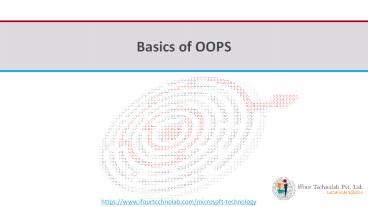C# Fundamentals - Basics of OOPS - PowerPoint PPT Presentation
Title:
C# Fundamentals - Basics of OOPS
Description:
Programming language model organized around objects rather than "actions" and data rather than “logic”. For a programming language to be a true OOP language, the language must meet the following criteria: abstraction, encapsulation, polymorphism, inheritance – PowerPoint PPT presentation
Number of Views:2597
Title: C# Fundamentals - Basics of OOPS
1
iFour Consultancy
https//www.ifourtechnolab.com/microsoft-technolog
y
2
Definition
- A markup language is a set of markup tags
- A markup language is a set of markup tags
- Programming language model organized around
objects rather than "actions" and data rather
than logic. Historically, a program has been
viewed as a logical procedure that takes input
data, processes it, and produces output data - For a programming language to be a true OOP
language, the language must meet the following
criteria - Abstraction
- Encapsulation
- Polymorphism
- Inheritance
https//www.ifourtechnolab.com/microsoft-technolog
y
3
Fundamentals
- Classes and Objects
- The terms class and object are sometimes used
interchangeably, but in fact, classes describe
the type of objects, while objects are usable
instances of classes. So, the act of creating an
object is called instantiation. Using the
blueprint analogy, a class is a blueprint, and an
object is a building made from that blueprint - Abstraction
- Abstraction manages the complexities of a
business problem by allowing you to identify a
set of objects involved with that business
problem - Encapsulation
- Encapsulation hides the internal implementation
of an abstraction within the particular object - Polymorphism
- It provides for multiple implementations of the
same method. For example, different objects can
have a Save method, each of which perform
different processing - Inheritance
- The excitement of Visual Basic .NET lies in
inheritance. Visual Basic 5 introduced the
concept of interface inheritance, which allows
you to reuse the interface of a class, but not
its implementation
https//www.ifourtechnolab.com/microsoft-technolog
y
4
What is a class?
- It can be defined as a template/blueprint that
describes the behaviors/states that object of its
type support - Example of simple class with member properties
and member methods. - public class Circle
- private decimal _radius
- public double radius getreturn _radius
set_radius values - public double Area()
- return 3.141592 _radius _radius
https//www.ifourtechnolab.com/microsoft-technolog
y
5
What is Object?
- It represents a particular instance of a class.
There can be more than one instance of an object.
Each instance of an object can hold its own
relevant data - Example of Simple instantiate of an object of the
class in the example of previous slides - Circle objCircle new Circle() //here
objCircle is an instance of a class - Circle objCir new Circle() //here objCir is
an instance of a class - Both the instantiation(Objects) holds the related
data and members of the class and can be used for
different purposes
https//www.ifourtechnolab.com/microsoft-technolog
y
6
Abstraction
- Example
- Real world example Laptop
- When derived class inherited with abstract class
derived class must be override abstract class
methods
https//www.ifourtechnolab.com/microsoft-technolog
y
7
Encapsulation
- Hiding irrelevant data from the user
- A class may contain much information that is not
useful for an outside class or interface - So classes use encapsulation to hide its members
that are not relevant for an outside class or
interface - It can be done using access specifiers
- In the same example of Circle class Private is
a specifier used for Member variable. So It hides
the data to be used outside the class - private decimal _radius
https//www.ifourtechnolab.com/microsoft-technolog
y
8
Inheritance
- Use in the small, when a derived class "is-a"
base class - enables code reuse
- enables design reuse polymorphic programming
- Example
- a Student is-a Person
https//www.ifourtechnolab.com/microsoft-technolog
y
9
Inherited Methods
https//www.ifourtechnolab.com/microsoft-technolog
y
10
Inherited Methods
https//www.ifourtechnolab.com/microsoft-technolog
y
11
Polymorphism
- Static polymorphism
- Function overloading
- Operator overloading
- Dynamic Polymorphism
- abstract classes
- virtual functions
https//www.ifourtechnolab.com/microsoft-technolog
y
12
Virtual and Overridden Methods
https//www.ifourtechnolab.com/microsoft-technolog
y
13
Combining Method Overriding and Hiding
https//www.ifourtechnolab.com/microsoft-technolog
y
14
Procedure v/s Object Oriented Programming
- It is a methodology to write the program where we
specify the code in form of classes and objects - Object-oriented programming is the successor of
procedural (structural) programming - Procedural programming describes programs as
groups of reusable code units (procedures) which
define input and output parameters. Procedural
programs consist of procedures, which invoke each
other - The problem with procedural programming is that
code reusability is hard and limited only
procedures can be reused and it is hard to make
them generic and flexible. - There is no easy way to work with abstract data
structures with different implementations - This is how objects came to be. They describe
characteristics (properties) and behaviour
(methods) of such real life entities
https//www.ifourtechnolab.com/microsoft-technolog
y
15
Interface
- Multiple Inheritance Support
- Example
- SmartPhone
- OS()
- AppStore()
https//www.ifourtechnolab.com/microsoft-technolog
y
16
References
- https//www.tutorialspoint.com/csharp/
- http//www.c-sharpcorner.com/UploadFile/mkagrahar
i/introduction-to-object-oriented-programming-conc
epts-in-C-Sharp/
https//www.ifourtechnolab.com/microsoft-technolog
y
17
- Thank You..
https//www.ifourtechnolab.com/microsoft-technolog
y































